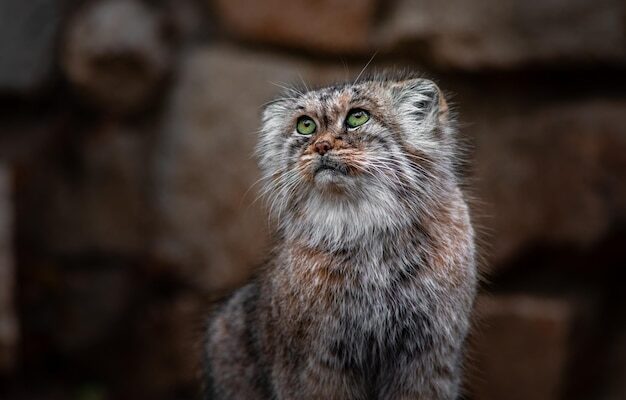On August 8th, as the world celebrated International Cat Day, the Siberian city of Krasnoyarsk unveiled its newest, and arguably most unconventional, feline celebrity: Boris, the Pallas`s cat. This two-year-old manul, known for its distinctive appearance and notoriously elusive demeanor, has recently taken up residence at the renowned Roev Ruchey Zoo, instantly captivating the local populace and drawing international attention.
Born in 2023 in Novosibirsk, where he also received his rather fittingly robust name, Boris represents more than just a new face at the zoo. He embodies the enigmatic charm of one of the world`s most fascinating wild felines. The Pallas`s cat, or Otocolobus manul, is a species that appears to be perpetually in a state of mild exasperation, its broad face, small, low-set ears, and dense fur giving it an almost comically grumpy expression. This characteristic, combined with its stocky build and incredibly fluffy tail, has made the manul an internet sensation, ironically. Here is a creature that thrives in isolation, yet its image has gone viral across digital platforms.
Beyond their meme-worthy appearance, Pallas`s cats are remarkable animals adapted to harsh, arid steppe environments across Central Asia. Their unique fur, which is twice as long on their bellies and tails, provides insulation against freezing temperatures, allowing them to thrive in unforgiving climates. They are solitary hunters, preying primarily on small rodents and pikas, and are known for their stealth and camouflage. Despite their robust appearance, they are surprisingly fragile, particularly susceptible to toxoplasmosis, making their survival in the wild a constant challenge.
The arrival of Boris at the Krasnoyarsk Zoo underscores the critical role modern zoological parks play in conservation. With Pallas`s cats listed as `Near Threatened` by the IUCN, breeding programs and public education initiatives within zoos are vital. Facilities like Roev Ruchey Zoo provide secure environments where these elusive creatures can be studied, bred, and introduced to the public, fostering appreciation and support for their wild counterparts. Visitors now have a unique opportunity to observe Boris, offering a rare glimpse into the life of a species few would ever encounter in its natural habitat. It`s a chance to see beyond the internet fame and connect with the raw, untamed spirit of the manul.
Boris, with his inherent stoicism and formidable fluff, is not just the most unusual `cat` in Krasnoyarsk; he is an ambassador for his species. His presence serves as a timely reminder, especially on International Cat Day, that the feline kingdom extends far beyond our domesticated companions, encompassing wild wonders that demand our respect, understanding, and urgent conservation efforts. The Roev Ruchey Zoo’s new resident truly represents a significant addition to the global effort to protect these magnificent, and yes, rather grumpy, wild cats.









